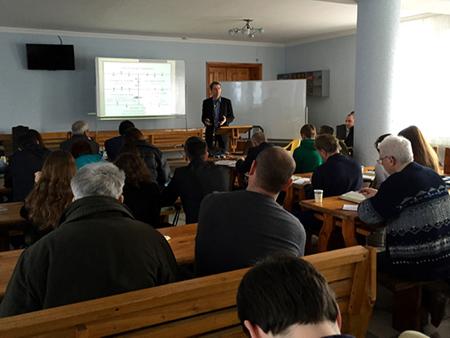American ethnocentricity can have devastating consequences.
To be clear, I’m an American. And I’m grateful for the blessings God has made available to me as an American. One of those favors is that, like most of the people reading this blog, God has given me the privilege of having some training in biblical counseling. And, like some of the people reading this blog, I have also been privileged of the Lord to spend significant time in other nations.
In fact, in the first nine years of its existence, BCMW has trained pastors and other Christian leaders in more than 20 nations. We also continue to maintain a significant “waiting list” of nations who have contacted us, seeking our help.
As a result, our Lord has allowed me to learn a few things about doing biblical counseling training in other nations. One lesson seems more important than the others.
One size DOES NOT fit all.
On a recent Monday morning I enjoyed a Skype call with a couple of dear brothers. One, a leader in our movement, had commended the ministry of BCMW to the other, a leader of a school in another country. As we discussed the curriculum that might be used in that setting, the school administrator was clear about this: a polemic approach would be completely inappropriate.
Twelve hours later I was chatting with a brother from halfway around the world. As we discussed what I might teach there, he emphasized the necessity of constructing a clear distinction between the systems of psychological thought and practice (both secular and integrationist) and a biblical sufficiency-based approach to soul care. He said, “Wayne, you’re going to war!”
This need for flexibility is curriculum planning is true even when programs are in the same country. (See my earlier blog.) In one nation, our academic program students made it clear that their country was becoming “highly psychologized.” But a five-hour train ride to our modular program location introduced us to people who never even heard of trying to combine objective truth with subjective observation. They said, “If you’re a Christian, you should believe the Bible!” (Amen!)
In yet another country a leader told us, “Our believers are psychologized, but making a clear distinction in approaches should come later rather than earlier.”
How Does the Bible Illustrate This Point?
Flexibility in the way you approach your ministry task—any ministry task, really—is a matter of careful research and case wisdom.
The Apostle Paul had a custom of sharing Jesus as the Christ in the synagogues of the towns he visited. But, in successive chapters, he maintained that custom (Acts 17:2, 10); he engaged Greeks in the Aeropagus (Acts 17:22-31); he taught in the house of Titius Justus, a Gentile (Acts 18:7); and he returned to speaking in a synagogue (Acts 18:19).
In describing this activity a few years later, Paul said,
“For though I am free from all, I have made myself a servant to all, that I might win more of them. To the Jews I became as a Jew, in order to win Jews. To those under the law I became as one under the law (though not being myself under the law) that I might win those under the law. To those outside the law I became as one outside the law (not being outside the law of God but under the law of Christ) that I might win those outside the law. To the weak I became weak, that I might win the weak. I have become all things to all people, that by all means I might save some. I do it all for the sake of the gospel, that I may share with them in its blessings” (1 Corinthians 9:19-23, emphasis added).
So, What Are We to Do?
Here are some practical steps to make your overseas biblical counseling training as effective as possible:
- Study the culture in which God is sending you to serve.
Perhaps the highest compliment I’ve received recently was given to me by a pastor in one of our far-away locations. He said, “Thanks for not being ‘so American.’” I knew exactly what he meant. Americans have a reputation for being arrogant and demanding. We go to train with a pre-determined curriculum and present it whether or not it meets the needs of the nationals. This “take-it-or-leave-it” approach is both offensive and ineffective.

- Get well-acquainted with the national partner who will be hosting your instruction.
Is the on-site partner a national or a missionary? If a missionary, how long have they served in this place? The answers to these questions will help you assess the accuracy of the answers to the other issues.
- Learn all you can about the theological and ministerial training of those you will teach.
In some places even the pastors are illiterate or barely literate. In other places there is a strong and historic Arminian theology. And there are places where what little biblical training is available is mixed with Catholicism, animism, or mysticism. And remember: once you cross the waters, all denominational names lose the meanings you’ve come to know in America.
- Develop your training curriculum on the basis of what you have discovered in #1-3.
Prayerfully consider not only what to teach (and the order of the subjects you’ll address), but how to teach (your pedagogical approach) and how much to teach in the time you’ve been given.
- Prepare to adapt your curriculum—in country, if necessary—as you come to learn the culture and its people.
Sometimes you just need to stop, review, explain, and expand on what you’ve taught. Don’t be a slave to your curriculum plan. Rather, seek to meet the needs of those God has called you to serve.
Join the Conversation
How have you adjusted your curriculum when training soul care providers overseas? What do you believe are the most critical issues in deciding how to make these adjustments?